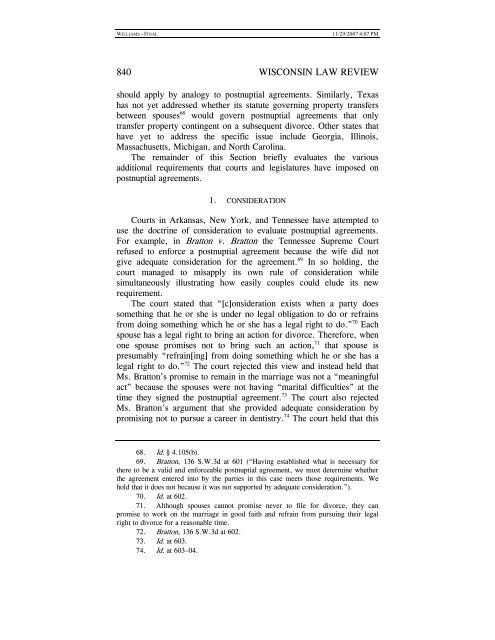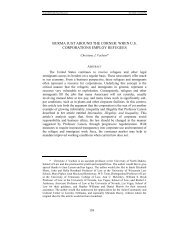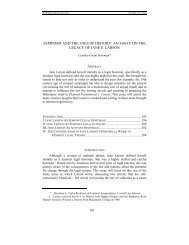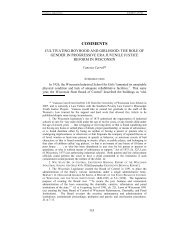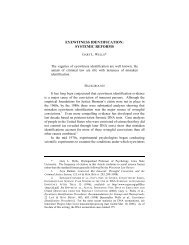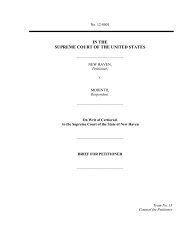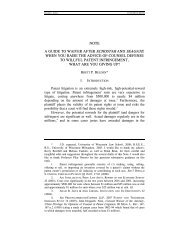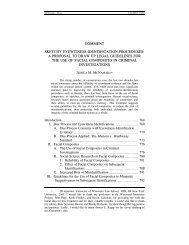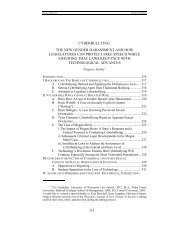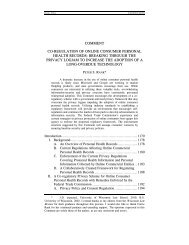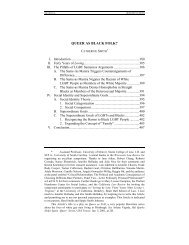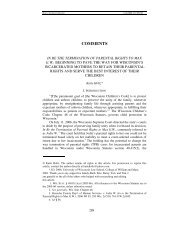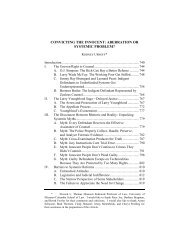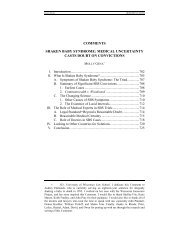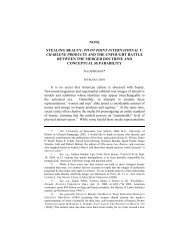POSTNUPTIAL AGREEMENTS - UW Law School
POSTNUPTIAL AGREEMENTS - UW Law School
POSTNUPTIAL AGREEMENTS - UW Law School
Create successful ePaper yourself
Turn your PDF publications into a flip-book with our unique Google optimized e-Paper software.
WILLIAMS - FINAL 11/29/2007 4:07 PM<br />
840 WISCONSIN LAW REVIEW<br />
should apply by analogy to postnuptial agreements. Similarly, Texas<br />
has not yet addressed whether its statute governing property transfers<br />
between spouses 68 would govern postnuptial agreements that only<br />
transfer property contingent on a subsequent divorce. Other states that<br />
have yet to address the specific issue include Georgia, Illinois,<br />
Massachusetts, Michigan, and North Carolina.<br />
The remainder of this Section briefly evaluates the various<br />
additional requirements that courts and legislatures have imposed on<br />
postnuptial agreements.<br />
1. CONSIDERATION<br />
Courts in Arkansas, New York, and Tennessee have attempted to<br />
use the doctrine of consideration to evaluate postnuptial agreements.<br />
For example, in Bratton v. Bratton the Tennessee Supreme Court<br />
refused to enforce a postnuptial agreement because the wife did not<br />
give adequate consideration for the agreement. 69 In so holding, the<br />
court managed to misapply its own rule of consideration while<br />
simultaneously illustrating how easily couples could elude its new<br />
requirement.<br />
The court stated that “[c]onsideration exists when a party does<br />
something that he or she is under no legal obligation to do or refrains<br />
from doing something which he or she has a legal right to do.” 70 Each<br />
spouse has a legal right to bring an action for divorce. Therefore, when<br />
one spouse promises not to bring such an action, 71 that spouse is<br />
presumably “refrain[ing] from doing something which he or she has a<br />
legal right to do.” 72 The court rejected this view and instead held that<br />
Ms. Bratton’s promise to remain in the marriage was not a “meaningful<br />
act” because the spouses were not having “marital difficulties” at the<br />
time they signed the postnuptial agreement. 73 The court also rejected<br />
Ms. Bratton’s argument that she provided adequate consideration by<br />
promising not to pursue a career in dentistry. 74 The court held that this<br />
68. Id. § 4.105(b).<br />
69. Bratton, 136 S.W.3d at 601 (“Having established what is necessary for<br />
there to be a valid and enforceable postnuptial agreement, we must determine whether<br />
the agreement entered into by the parties in this case meets those requirements. We<br />
hold that it does not because it was not supported by adequate consideration.”).<br />
70. Id. at 602.<br />
71. Although spouses cannot promise never to file for divorce, they can<br />
promise to work on the marriage in good faith and refrain from pursuing their legal<br />
right to divorce for a reasonable time.<br />
72. Bratton, 136 S.W.3d at 602.<br />
73. Id. at 603.<br />
74. Id. at 603–04.


